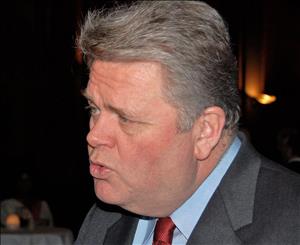On November 8, 2005, Washington voters overwhelmingly approve a sweeping ban on smoking indoors (and near doorways), and authorize performance audits of government agencies. Two initiatives proposing competing medical malpractice reforms, generally viewed as a doctors-versus-lawyers battle, double the previous spending record for ballot measures but are both defeated. To the surprise of many, an initiative to repeal the Legislature's 9.5 cent gas tax is also rejected. Seattle voters soundly defeat the monorail project they supported in four previous elections and Democrats prevail in a few high profile local races.
No Smoking
Even many smokers voted for Initiative 901, the Clean Indoor Air Act, which won by a landslide -- 63.2 percent (1,153,353 votes) to 36.8 percent (670,225 votes). The vote gave Washington the strictest indoor smoking ban of any state in the nation. Restaurants, bars, card rooms, bowling alleys -- all public spaces except Indian casinos (which are exempt from state law) -- became legally smoke-free when the law took effect at midnight on December 7, 2005. One provision of the smoking ban that prompted considerable discussion was the requirement that businesses prohibit smoking outdoors within 25 feet of doors, windows, or air intakes. However, police in Seattle and elsewhere made clear that they were not planning to ticket sidewalk smokers.
Primary responsibility for ensuring compliance with the indoor smoking ban lay with county health departments, which emphasized education rather than sanctions. The first reported enforcement action came nearly two months after the Clean Indoor Air Act took effect, when Whatcom County Health Department officials sought fines against a Bellingham tequila cantina accused of repeated violations.
Two other statewide initiatives, of the six on the 2005 ballot, also passed easily. Initiative 900, which authorized the state auditor to conduct performance audits of state and local governments, was proposed by for-profit initiative promoter Tim Eyman, best known for his "government-bashing" (Modie) anti-tax initiatives. Unlike those controversial measures, I-900 was widely supported by commentators and elected officials and it won handily, 56.4 percent (994,757 votes) to 43.6 percent (767,844 votes). A legislative proposal dealing with the membership of the Commission on Judicial Conduct was even less controversial -- no one submitted a voters' pamphlet statement against it and it won 67.5 percent of the vote.
Medical Malpractice
A record-shattering $15 million was spent on the two medical malpractice initiatives, I-330 and I-336, both of which failed. Insurance companies, drug manufacturers, and doctors introduced and supported I-330, which would have sharply limited damage awards for pain and suffering caused by medical negligence. Trial lawyers and patients-rights groups spearheaded the opposition to I-330, which lost by 56.7 percent (1,027,117 votes) to 43.3 percent (783,435 votes). Some trial lawyers also supported I-336, which would have required notice for malpractice insurance increases and revoked the license of doctors found to have committed malpractice three times in 10 years. Although I-336 lost by an even larger margin (60.2 percent to 39.8 percent), the lawyers, whose primary goal was blocking damage limits, were seen as the winners in the expensive battle.
Also defeated was I-912, which would have repealed the phased 9.5-cents-per-gallon gas tax enacted by the Legislature earlier in the year to fund $8.5 billion in transportation projects. Initially widely expected to pass, I-912 lost by 54.6 percent (991,196 votes) to 45.4 percent (823,366), a result many commentators attributed to Hurricane Katrina, and lesser disasters in Washington, including rockslides on Interstate 90, which underlined the need for infrastructure rehabilitation.
Local Winners
In the off-year election there were no statewide candidates on the ballot. Democrats won the only legislative race, a special election for a House of Representatives seat in District 19 in Southwest Washington. Incumbent Dean A. Takko, appointed to replace former Democratic Rep. Brian Hatfield, who had resigned mid-term, easily defeated Republican Dawn Courtney and Libertarian Judi Roberts Fiest. Democrats also regained control of the Snohomish County Council when Dave Somers defeated Jeff Sax, who had beaten him four years before.
In King County, Democratic incumbent Executive Ron Sims, blamed by Republicans for the election flaws highlighted in the controversy over Christine Gregoire's record narrow victory in the governor's race following several recounts, was thought to be vulnerable. Republicans kept the pressure on the county elections department by challenging 1,944 voter registrations, most in largely Democratic Seattle, but the tactic may have backfired when some challenges were withdrawn as mistaken and others were rejected (after the election) by the canvassing board. Sims easily defeated Republican County Councilman David Irons. On the King County Council, which an earlier initiative had downsized from 13 members, the nine remaining incumbents all won by wide margins. In Seattle, Mayor Greg Nickels (b. 1955) and four city council incumbents were also easily re-elected.
End of the Green Line
Seattle voters soundly defeated the Seattle Monorail Project (SMP), which they had previously approved in 1997, 2000, 2002, and 2004. Concerns over financing and leadership doomed the proposed Green Line to West Seattle and Ballard. The car tab tax that financed the project provided only two thirds of the money that project managers had estimated and a proposed construction contract was $300 million more than they planned. The final straw may have been release of a proposed financing plan (eventually rejected) whose interest charges boosted the total cost of the $2.1 billion project to over $11 billion.
After Mayor Nickels withdrew city support, the SMP board returned to voters with a proposition to approve a shortened monorail route (10 miles instead of the earlier 14-mile plan). Voters declined by a margin of 64.5 percent (119,381 votes) to 35.5 percent (65,691 votes), and SMP began shutting down and planning to sell its assets to pay the $110 million debt it had incurred.

